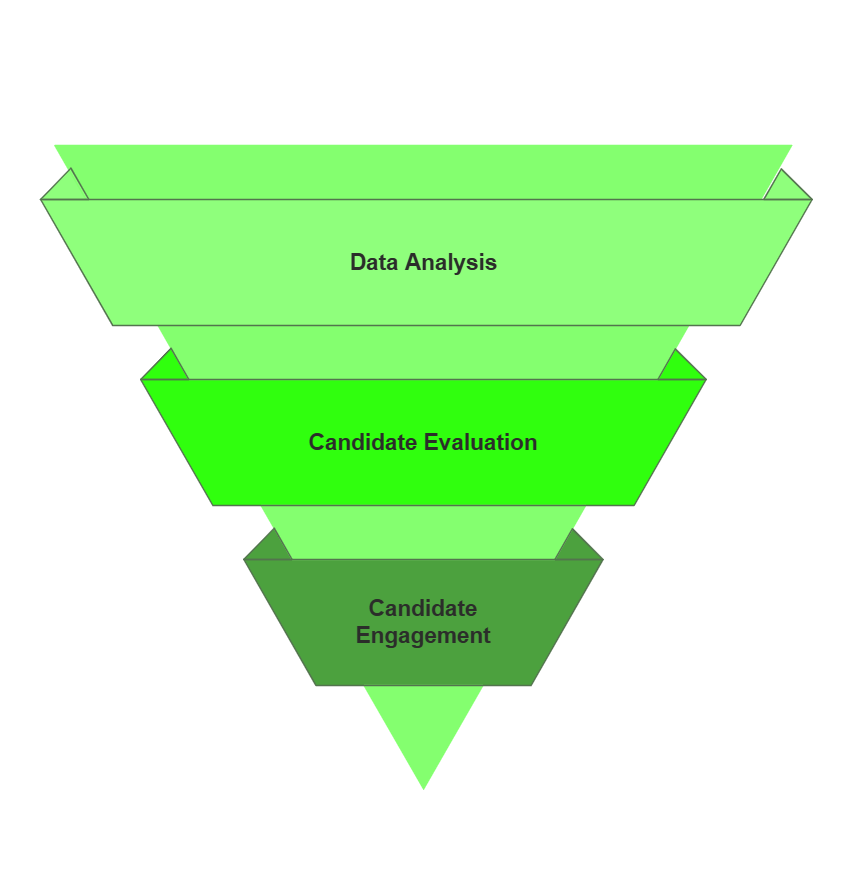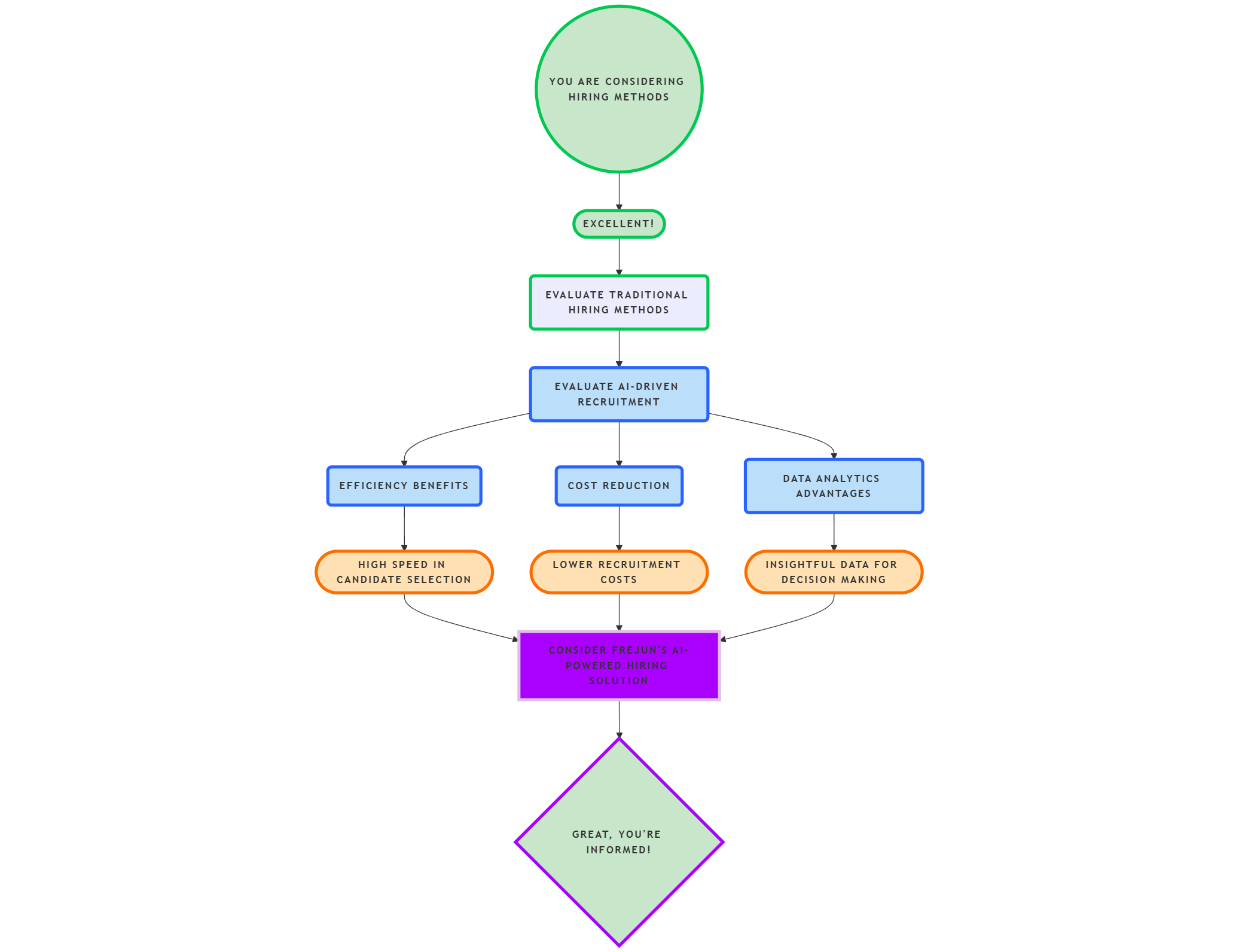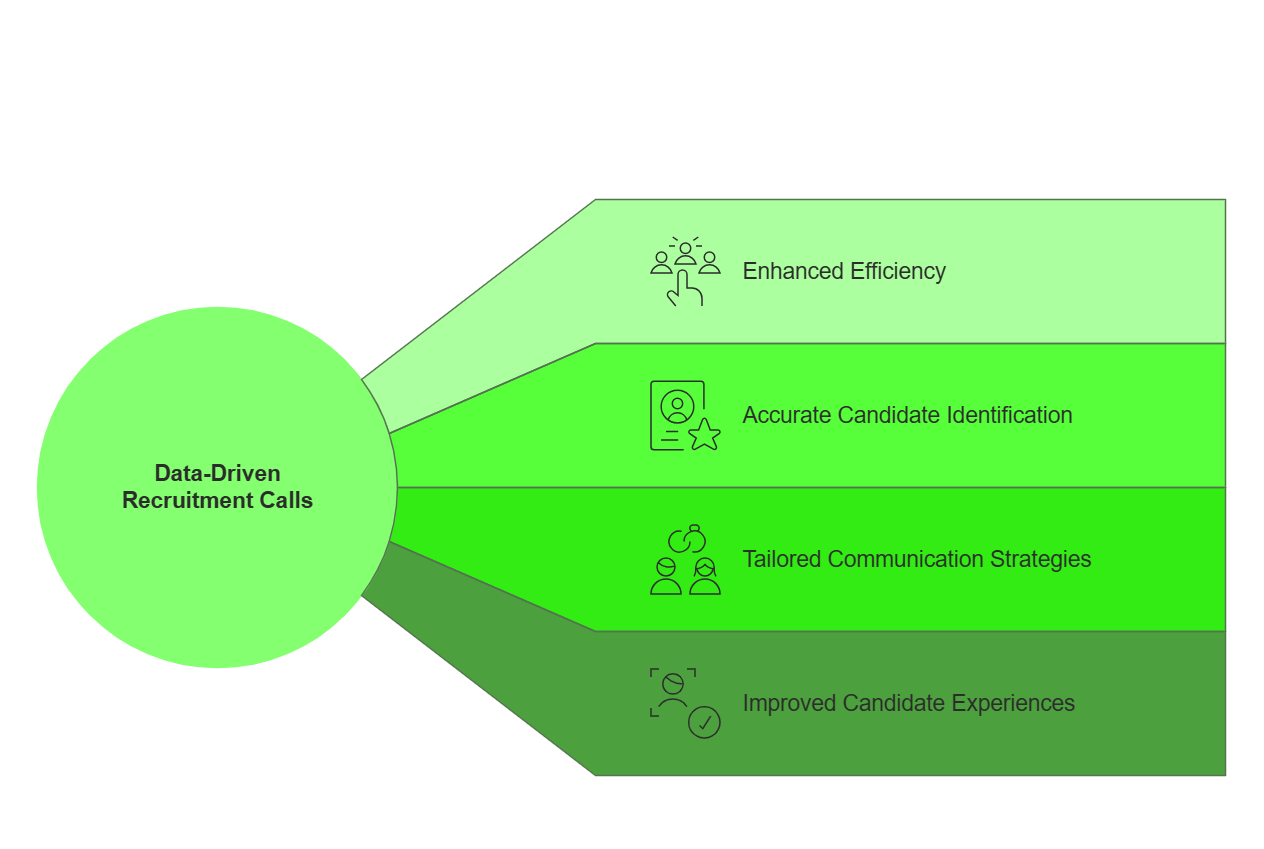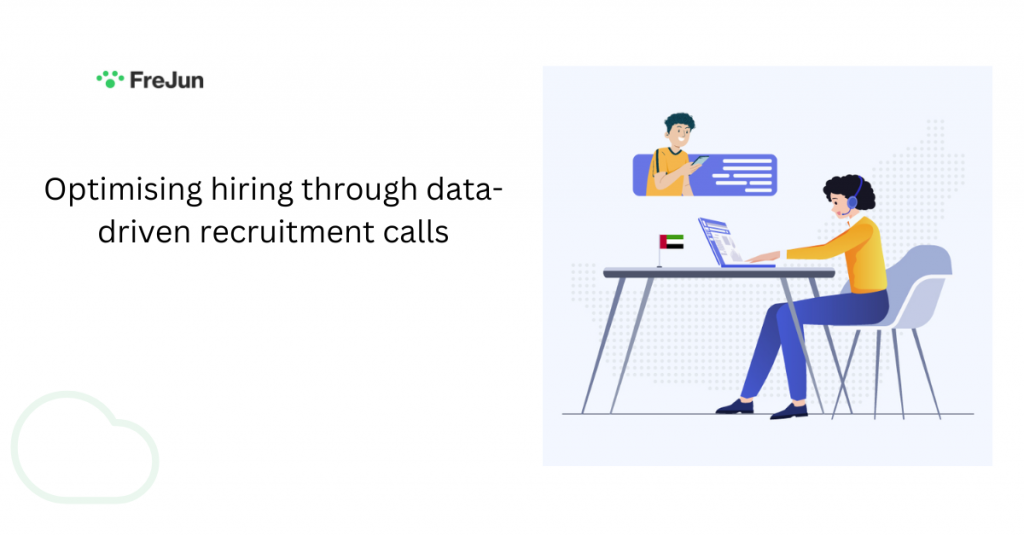Last updated on July 1st, 2025 at 04:34 pm
In 2025, the recruitment landscape is evolving rapidly, with companies increasingly relying on data to streamline hiring processes. One of the key areas where data-driven approaches are making a significant impact is in recruitment calls. By using data to inform decisions and personalize outreach, businesses can attract top talent more efficiently and effectively. Traditional recruitment calls always relied on guesswork and intuition. This not only resulted in bad hires but made the whole hiring process time-consuming and uncertain. A survey claims that around 75% of all hires are usually bad and are not fit for the job.
So, where are the recruiters going wrong when it comes to recruitment calls? How can they make the process more fruitful?
The answer is DATA!
You need to embrace a strong data-driven approach to transform the outcomes of recruitment calls. It will make your process efficient and cost-effective by reducing bad hires. Now, before you ask us how, it is critical that we explain what data-driven recruitment calls encompass.
Table of contents
- What are Data-Driven Recruitment Calls?
- Key Data-Driven Metrics for Smarter Recruitment Calls
- Traditional vs. Data-Driven Recruitment Calls
- Benefits of a Data-Driven Recruitment Calls
- Summary of Benefits: Data-Driven Recruitment Calls
- Collecting Essential Data for Your Recruitment Call Strategy
- Key Metrics to Track
- Closing Thoughts
- Frequently Asked Questions
What are Data-Driven Recruitment Calls?

Data-driven recruitment calls are those calls that are driven by tangible facts and stats derived via data analytics. These calls will help in selecting the best candidates and optimizing the entire hiring process.
The entire data-driven approach eliminates guesswork by analyzing and filtering the right candidates who have the right skills and mindset that resonates with the goals of the organization. From identifying better candidates to reducing hiring costs, data-driven recruitment calls come with an array of benefits. Let’s look into some of them.
Key Data-Driven Metrics for Smarter Recruitment Calls
| Metric | Business Impact |
| Call Duration | Identifies engagement level of candidates |
| Keyword Analysis | Ensures relevant skills match job requirements |
| Response Time | Measures candidate enthusiasm and availability |
| Sentiment Analysis | Detects confidence and interest levels |
| Call Drop-Off Rate | Evaluates areas for process improvement |
Traditional vs. Data-Driven Recruitment Calls

Benefits of a Data-Driven Recruitment Calls

When you approach recruitment calls with adequate preparation armed with all the necessary data about the role and the candidate, you can easily determine whether the candidate is a good fit or not. You no longer have to gauge a candidate’s capability through their resume or their communication skills over the phone. This greatly reduces the time to hire. In short, you do not have to spend an hour or conduct multiple interviews to only conclude that the candidate is not right for the role.
Due to the data-driven approach, the productivity of the recruiter also shoots up. They can now spend their time on other mission-critical activities such as onboarding and training the candidates.
Data-driven recruitment calls also eliminate biases. For example, imagine you are hiring for a startup and interviewing two candidates over the phone –
- Candidate A – Has an excellent academic record, good references, and speaks fluently on the phone.
- Candidate B – Has an average academic record, no references, and communication issues while speaking on the phone.
Now, most recruiters would pick candidate A.
However, candidate A doesn’t have the required experience in the technology you are hiring for, while candidate B has plenty of experience in it. As a recruiter, it will be hard to find out how qualified they are in that technology as most people convince their way into the next round.
In most cases, only after 1-2 rounds with hiring managers will it be found that the candidate doesn’t have the necessary experience. But by then, the hiring manager’s precious time is already wasted.
1. Increased Quality of Hires
When recruiters are armed with comprehensive data about a candidate and the role, they can make more informed judgments. This precision in evaluation significantly increases the likelihood of making better, more suitable hires.
2. Reduced Hiring Times
With all necessary candidate information readily available, decision-making becomes remarkably faster. Recruiters no longer need multiple, lengthy interviews to determine fit, streamlining the entire hiring timeline.
3. Decreased Cost Per Hire
Embracing data-driven methods can lead to substantial cost savings. By reducing reliance on external hiring agencies and decreasing the overall time-to-hire, your expenditure per candidate significantly drops. Furthermore, access to various metrics helps identify and close inefficiencies in your hiring process, preventing financial leaks.
4. Improved Candidate Experience
Data allows for a highly personalized hiring experience. By understanding candidate preferences and engagement patterns, recruiters can tailor their outreach and communication, leading to a more positive and engaging journey for applicants.
5. Elimination of Bias
Data-driven recruitment inherently introduces objectivity into the hiring process. Personal interests or unconscious prejudices are minimized, as decisions are backed by tangible data rather than subjective impressions, ensuring a fair and unbiased assessment of every candidate.
In 2025, data-driven recruitment calls are no longer just a trend but a vital component of an efficient and successful hiring strategy. By utilizing data to improve candidate targeting, personalize outreach, and optimize processes, businesses can enhance their recruitment efforts, save time, and improve their chances of hiring the best talent. As recruitment continues to evolve, embracing data-driven calls will be key to staying competitive and successful in attracting top candidates.
Summary of Benefits: Data-Driven Recruitment Calls
- Increased quality of hires: When you know every important detail about the candidate, you are bound to make better judgments about whether they are a good fit or not.
- Reduced hiring times: Since you have all the information about a candidate at your fingertips, you can make decisions way quicker.
- Decreased cost per hire: For starters, you can stop spending money on hiring agencies to manage your recruitment. Secondly, by reducing hiring times, your cost of hiring will go down. Lastly, you get access to various metrics and data that you can use to close all the leaks in your hiring process.
- Better candidate experience: Thanks to data, you can easily personalize your hiring calls and give the candidate a highly tailored experience.
- No bias: The hiring process in your organization will be automatically unbiased, as personal interests or prejudices cannot interfere in the final judgment, which, in turn, is because you have data to back the hire.
Collecting Essential Data for Your Recruitment Call Strategy
The easiest way to collect data for your recruitment calls is from your ATS (Application Tracking System). It has all the necessary information related to your candidates, including their job history, location, education, skillset, etc. If you do not have one for your organization, it is a worthy investment because it lets you easily manage and track applicants. It will keep your data organized and make the data accessible to all your team members 24X7.
Apart from that, past candidates’ data can help. You can easily get this data if you are using a cloud telephony application. Listen to the call recordings of your past interactions with different candidates and identify trends and patterns. Find out which type of candidates are ideal for a particular type of role.
You can even listen to the call recordings of other recruiters who are more experienced than you. This way, you can learn from their conversation and understand how they shortlisted a particular candidate.
Frejun not only comes with automated call recording features but also gives you access to a customized analytics dashboard where you can track the key metrics related to your recruitment calls. Even better, it is integrated with most of the ATSs currently available, thereby offering you a unified platform for handling all the recruitment data.
This brings us to the next topic – What metrics related to your calls should you ideally track?
Key Metrics to Track
Here are some of the key numbers that one must track related to their recruitment calls –
1. Call Volume
Call volume is the total number of calls you make in a particular duration. It could be an hour, day, week, or even month. The more calls you make, the wider your talent pool is. Monitoring the total number of calls made by you is a good way to measure if you are putting enough effort into sourcing candidates. You can compare the call volume with other recruiters to see how ahead or behind you are in terms of the number of calls made.
2. Average Call Time
By monitoring the average call time, you can identify which type of candidate is taking a lot of time and who isn’t. It will help you identify bottlenecks and solve them to make the average call time as short as possible.
3. Percentage of Answered Calls
Put simply, the percentage of answered calls is the number of candidates who answered your calls. If this number is pretty low, then you need to ask yourself two questions –
- Is your database clean? In other words, are the phone numbers of the candidate right?
- Are you calling them at the right time?
Once you address these two points, your percentage of answered calls should automatically shoot up. In case the number still remains low, it may be time to revise your talent pool list and then proceed.
4. Calls to Interview Ratio
The calls to interview ratio is the number of recruitment calls that get converted into an interview. Also, when this number is high, it means your approach is working as you have started finding qualified candidates for the job. A low ratio indicates that you are not targeting the right type of candidates as most of them are not attending the interviews.
The best part about these metrics is that you do not have to get your hands dirty in tracking them. Frejun will do it for you. All you have to do is use these data correctly and make informed decisions.
Ready to revolutionize your hiring? Explore FreJun’s Data-Driven Recruitment Solutions!
Closing Thoughts
In 2025, recruitment calls will continue to evolve with the help of data. By utilizing data-driven strategies, companies can enhance their hiring processes, improve candidate experience, and ultimately make more informed decisions that lead to better hires. The future of recruitment is here, and it’s driven by the power of data Recruitment is tough. Recruitment by phone is tougher. As a recruiter, you need all the help in the world to transform recruitment calls into success stories. This is where data and Frejun can help. Even if you are someone who makes decisions based on intuition, you will find a stronger ally in data provided by Frejun as it will help you see what worked and what didn’t in the past hiring processes. This also will help you improve all your future hiring decisions. Begin your journey with Frejun by signing up for a free 7-day trial now.
Further Reading – Key things to know about VoIP for recruiters
Frequently Asked Questions
Data-driven recruitment uses metrics and analytics to guide hiring decisions. FreJun tracks call outcomes, candidate responses, and engagement to help recruiters refine their calling strategy.
Analyzing call duration, response rate, and follow-up success helps optimize recruitment. FreJun provides detailed analytics so you can identify what works and what doesn’t.
Call recordings allow teams to analyze tone, messaging, and objections. FreJun offers secure call recording features that help recruiters train and adjust strategies accordingly.
Track call outcomes, time of contact, objections raised, and follow-up conversions. FreJun automatically logs these data points for every call to make insights actionable.
Yes, using data to optimize touchpoints, call timing, and scripts speeds up hiring. FreJun enables faster decision-making through real-time call performance dashboards.
FreJun simplifies data usage with visual dashboards, au ensurestomated reports, and integrated call tracking so recruiters get insights without overwhelming complexity.
Because it replaces guesswork with proven strategies that lead to better hires. FreJun empowers teams to base hiring calls on real-time insights, not intuition.
Data-driven recruitment uses analytics and hiring metrics to make informed decisions throughout the recruitment process. By leveraging data like candidate sourcing performance, time-to-hire, and call insights from tools like FreJun, companies can streamline hiring, reduce bias, and improve overall recruitment efficiency.
